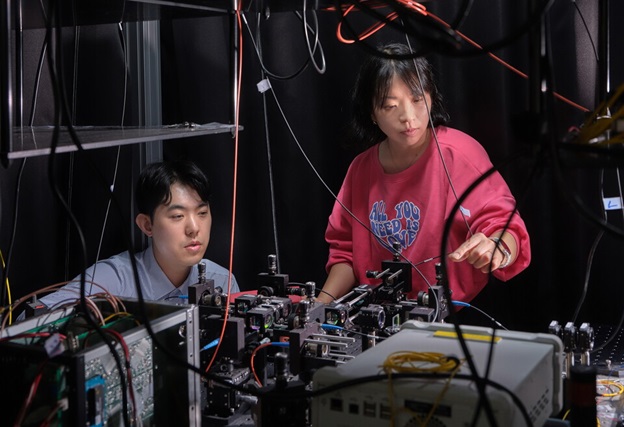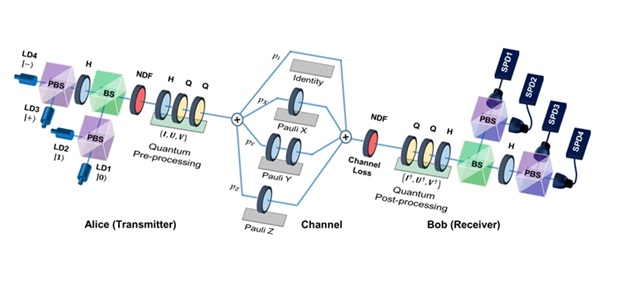A team of Korean researchers has established, for the first time worldwide, a new “measurement-protected (MP)” theory proving that quantum key distribution (QKD) can remain stable without measurement calibration of quantum states—long regarded as an essential step. The team also validated the theory experimentally.
On the 30th, the Electronics and Telecommunications Research Institute (ETRI) announced that, in collaboration with KAIST, it had developed the world’s first new technology enabling stable quantum communications in moving environments such as satellites, ships, and drones.
Quantum communications, which transmit information via the quantum states of light, are highly precise but notoriously unstable in wireless or mobile settings where weather and environmental factors cause rapid fluctuations. Particularly in sky, sea, or aerial environments, maintaining reliable transmission of quantum states has been a critical challenge.
This study overcomes those barriers, demonstrating for the first time that quantum information can be reliably exchanged in motion. The advance opens pathways for applying quantum technologies to satellite-to-ground secure links, drone communications, and maritime networks.
Quantum key distribution (QKD) is a technology that distributes encryption keys that are fundamentally impossible to eavesdrop on using quantum mechanics principles. Existing QKD required constant recalibration of the receiver’s measurement devices whenever the channel environment shifted. The KAIST–ETRI team proved instead that with simple local operations, secure key distribution is possible regardless of channel conditions. The theory was established by Prof. Joonwoo Bae’s group at KAIST, while experimental verification was carried out by ETRI researchers
Researchers employed a 100 MHz vertical-cavity surface-emitting laser (VCSEL) to generate single-photon pulses. The VCSEL, a type of semiconductor laser, emits light vertically from the top surface of a chip.
Crucially, the MP-based QKD system demonstrated tolerance of a quantum bit error rate (QBER) up to 20.7%, meaning that as long as the error rate of received quantum bits remains below this threshold, secure key distribution is possible without calibration. This establishes a foundation for reliable QKD in noisy, real-world conditions.
The researchers believe that these achievements could be applied to environments similar to satellite-to-ground links. The results, co-authored by ETRI researcher Haesin Ko and KAIST’s Dr. Spiros Kechrimparis, were published on June 25th in the IEEE Journal on Selected Areas in Communications.

In parallel, ETRI also addressed another long-standing bottleneck: polarization-dependent loss in integrated-chip QKD systems. By introducing a simple optical correction method, the team demonstrated stable key distribution without performance degradation—work that appeared in March as the cover article of Advanced Quantum Technologies. This is expected to accelerate the commercialization of compact, lightweight QKD devices, which could replace today’s bulky and costly bulk-optics systems.
ETRI emphasized that integrated chip-based research is essential for the widespread adoption of QKD technology, adding that numerous technical challenges beyond polarization-dependent loss must still be overcome. The institute noted that follow-up research is currently underway to address these issues.
Kyungchun Im, the head of the Quantum Communication Laboratory at ETRI, said, “Research on integrated chips is essential for the widespread adoption of QKD. In addition to polarization-dependent loss, numerous technical challenges must be addressed to implement QKD systems using integrated chips, and further research is necessary.”
Chunju Yoon, head of Quantum Technology Research at ETRI, said, “Independence from channel fluctuations greatly enhances the flexibility of quantum cryptography. We aim to expand this technology to long-distance free-space links and lay the groundwork for a global quantum network.”
Professor Joonwoo Bae of KAIST added, “This achievement is a decisive turning point that brings trustworthy quantum-secure communications into practical reality, even in complex environments.”
Over the past decade, ETRI has built a track record in quantum technology, including chip-based and miniaturized QKD modules, real-world 100-meter wireless QKD demonstrations, quantum computing compiler technology, transmission standardization with Korea’s top telecom operators, room-temperature quantum internet technologies, and the world’s first quantum-safety verification systems. Today, the institute is emerging as a global leader across quantum communications, quantum computing, and quantum sensing, focusing on both innovation and commercialization.
This project was supported by Korea’s Ministry of Science and ICT, the Institute of Information & Communications Technology Planning & Evaluation (IITP), the National Research Foundation of Korea, and the newly established Korea Aerospace Administration, under multiple national programs including “Core Quantum Internet Technologies,” “Quantum Cryptography Expansion and Next-Generation Development,” and “Integrated QKD and Transmission Technologies.”


